Peter MALONE
Wanted for Murder

WANTED FOR MURDER
UK, 1946, 103 minutes, Black and white.
Eric Portman, Dulcie Gray, Derek Farr, Roland Culver, Stanley Holloway, Barbara Everest, Bonar Colleano, Kathleen Harrison, Bill Shine, Wilfrid Hyde White, Moira Lister.
Directed by Laurence Huntingdon.
Wanted for Murder is based on a stage play. There are many dialogue sequences but the play is well opened out, to Hampstead Heath, Regents Park, Hyde Park, especially for the settings for the murders.
This is a 1940s interpretation of a serial killer. Eric Portman portrays him, well educated and well dressed businessman, his concern about his father and his death, that his mother thinks he is mad, his compulsions, meeting with women, the attraction, strangling them, the entries in his diary. He also likes to taunt the police – Scotland Yard inspector played by Roland Culver, with Stanley Holloway as his assistant.
There is also a focus on a young woman who works at a record store and her meeting with a bus conductor and falling in love, Dulcie Gray and Derek Farr.
The screenplay interweaves the behaviour of the killer with the Scotland Yard investigations. The film is of its time but is interesting in the further developments of the investigation of serial killers.
(With Stanley Holloway as the assistant to the inspector and Wilfrid Hyde White as the tour guide at Madame Tussauds, we are reminded that in 18 years’ time, one would be Alfred Dolittle and the other Col Pickering in My Fair Lady.)
1. A 1940s version of a serial killer? The impact then? Later developments of scenarios of serial killers?
2. The London setting, homes, the streets, Hampstead Heath, Regents Park, Hyde Park, Scotland Yard, shops, restaurants? The musical score?
3. The situation, the murders, young women strangled, no leads? The postcards to Scotland Yard, threats?
4. The introduction to Anne and Jack, on the Underground, crowded, talking, the hold-up, Jack accompanying Anne to the fair, the merry-go-round, her disappearance?
5. Anne, work in the record shop, the critical supervisor, Victor and his visiting, playing the record? Her meeting with him at the fair, his anger? Next day apology?
6. Victor at home, his mother and her concern, her aristocratic sister and the cigarettes, Florrie and her concern, Victor continually going out, walking, dapper, hat and cane, his concern about his father, his mother’s reticence?
7. The diary entry, the girl at Regents Park, the talking, his killing her, bending over, the American and his girl, lighting the cigarette? Their going to the police, the certainty about the identification, Victor present, Conway getting him to put on the hat and coat, the correct build, but the wrong man?
8. Victor, at work, his secretary, seemingly normal? The walking, Hampstead Heath, Scotland Yard interest, calling him in, getting to look at the photos, his identification of the man? The return to Scotland Yard? Politeness? Yet the irony of his comments on Conway?
9. Conway, Scotland Yard, methods? Interrogations? Sullivan, his assistant, his wife’s comments? Ellis, the drooping moustache, his following Victor? Losing him at Hyde Park?
10. Jack, bus driver, attraction to Anne, losing her, Scotland Yard and the identification, the going out together, falling in love? Victor and his intervention, and wanting to break off, the promise of the rendezvous?
11. The incident and Madame Tussauds, the guide, Colebrook the strangler, Victor destroying the statue?
12. Victor’s mother, her concern, his anger with her, the diary, seeing the entry, trying to burn it? Her collapse? Going to Scotland Yard, to Hyde Park?
13. Conway and Sullivan, going to the house, the evidence of the postcards, the diary entry, the torn stamp? Hurrying to Hyde Park?
14. The action at Hyde Park, Victor meeting Anne, the boat, the island, the threats? Jack and his arrival, his information about the statue, the boat, the confrontation? The police watching? And the obstinate official who would not clear the park without documents? The crowds and their being herded, breaking through the barriers?
15. Victor, in the water, holding up his hands, drowning? The 1940s interpretation of his psychology, split personality, sexuality, inheriting the genes from his father?
Death Goes to School
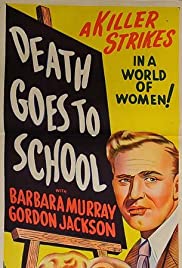
DEATH GOES TO SCHOOL
UK, 1953, 61 minutes, Black and white.
Gordon Jackson, Barbara Murray, Pamela Alan, Jane Elliott, Beatrice Varley, Sam Kydd.
Directed by Stephen Clarkson.
This is a short supporting feature from Britain in the early 1960s. It is quite simply, a murder mystery and a police investigation.
The setting is an all-girls school, one of the teachers being found dead. She is an unpopular woman, creating conflict amongst the staff, no one sympathetic to her. The police are called in in the form of Gordon Jackson with Sam Kydd as his assistant. There are interviews and interrogations – with a few flashbacks illustrating the aggression of the murdered woman.
This provides a variety of performances, from the businesslike headmistress concerned about the school, to a French teacher, to a young rather girlish teacher, to a bespectacled teacher who is concealing her private life, to an older teacher who has a niece in the school. However, the main attention is given to a sympathetic teacher, Barbara Murray, who provides information but also provide some leads, some of which she follows herself, in fact solving who is the murderer.
There is some background to each of the teachers and a revelation that the murdered woman was having an affair with the father of one of the girls in the school.
Old-fashioned in its way, but still a popular format, and easy hours crime entertainment.
Diplomatic Corpse, The
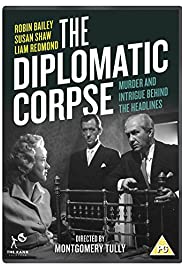
THE DIPLOMATIC CORPSE
UK, 1958, 65 minutes, Black-and-white.
Robin Bailey, Susan Shaw, Liam Redmond, Harry Fowler, Bill Shine, Charles Farrell.
Directed by Montgomery Tully.
A small-budget British supporting feature of the late 50s, blending the serious with touches of comedy.
Robin Bailey (successful on the British stage as Professor Higgins in My Fair Lady) is a crime journalist. Susan Shaw is the journalist working at the same paper, and the two are engaged. They are urged out by the editor to find some crime stories. When one comes in (and the audience has seen the crime), the journalist dismisses it.
However, there are quite some complications, the audience having seen a man tossing a briefcase onshore from a boat, his being coshed, the body pushed overboard, and a local spiv seeing everything and taking the briefcase. It turns out to contain 1000 pounds as well as heroin.
The police chief, Liam Redmond, checks with the journalist and various clues that each has begin to come together. There is also a visit from a phone operator working at an embassy. There are various visits to the embassy, diplomatic put-offs, Susan Shaw insinuating herself in the embassy as a substitute phone operator and becoming imprisoned.
With each development, it appears that a third secretary from the embassy was murdered, the spiv identifies the assistant at the embassy as the murderer and the spiv, picked up by the police, has concealed the heroine in the police car – which is later retrieved for an extradition sting to release Susan Shaw from the embassy.
There is a serious line with the embassy, the murder, drug dealing, cover-ups. There is also the kind of screwball comedy line with the two journalists and their interactions as well as dealings with the police inspector and his exasperation.
Old-fashioned, slight but pleasant.
Last Diamond, The/ Le Dernier Diamant
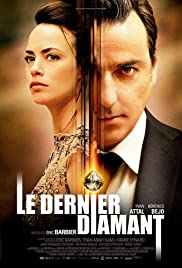
THE LAST DIAMOND/ LE DERNIER DIAMANT
France/Belgium/Luxembourg, 2014, 108 minutes, Colour.
Yvan Attal, Berenice Bejo, Jean- François Stevenin.
Directed by Eric Barbier.
The heist genre has always been prominent in entertainment. Especially when it concerns diamonds.
This film shows the preparation for an elaborate heist, the detailed planning, the many people involved, the international connections. It then shows the attempt at an auction, the stealing of the diamond – and failure. The latter part of the film shows further investigation into the robbery and a sting to expose the criminals.
The settings are Paris, Antwerp, Luxembourg.
Yvan Attal has a showy role as a professional thief, his being in prison, emerging and planning the heist with quite a cohort of friends and employed criminals. His main aim is to ingratiate himself with the young woman responsible for the auction of the diamond, Berenice Bejo, posing as her security expert, having a relationship with her.
There are details of the preparation, the mayhem at the actual social function and the auction, the consequences. When the woman is interrogated drive the police, the thief is touched and does his best to expose the truth, including the criminality of her father and the death of her mother, international connections. At the end of the film, there is a sting to substitute the diamond as well as expose the masterminds.
Fans of the heist genre will enjoy this one and its variations on the theme.
1. The title? A heist film? The preparation, the action, the failure, the investigation, the final sting?
2. The French settings, Paris? The Belgian settings, Antwerp? Luxembourg? The musical score?
3. The focus on Simon, his career, successes and failures, his associates? His technique, naked in the corridor, entry into the room, theft? Prison? Coming out again, meeting
Albert, the complexities of the plan? Meeting his parole officer and pretending injury?
4. The diamond, its reputation, the plan for the auction? Julia, her work, her relationship with her father, with her mother, the death of her mother? Her carrying on with the auction? The preparations, the security? The encounter with Simon, his ingratiating himself, his smooth talk and style? The relationship? The auction, the social gathering, media interest?
5. Simon, Albert, the various connections, the range of people involved in the robbery? Inside contact at the hotel? Security impersonation, police impersonation? And connection with the diplomatic corps? The preparation for the auction, Simon and his suave manner, his having to return to Paris, the parole officer, his pretending to be injured? Ingratiating himself with Julia?
6. The auction, preparation, people collapsing? The mayhem? Simon arrested by the police and escorted out? The disappearance of the diamond?
7. The police, the discovery of the robbery, of the impersonations?
8. The diamond,, the complexity? Julia and her being interrogated?
9. Simon, concerned for Julia, working with Albert? His communication with Julia, her resentment, his implicating her father? The explanations, the diplomatic connections, the betrayals? His planning?
10. Albert, making the contacts, the set-ups? The Russian buyer, the Dutch expert?
11. The meeting in Luxembourg, the impersonations, the substitution of the diamond?
12. Violent consequences, shootouts? Simon, Julia rescued?
13. The solution, the media response?
14. Simon, time in prison, coming out, with Albert, the naked routine in the corridor – and Julia in the room?
15. A Gallic variation on the heist genre?
Joe's Apartment
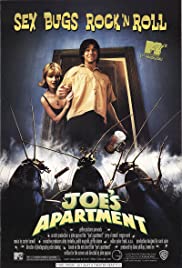
JOE'S APARTMENT
US, 1996, 80 minutes, Colour.
Jerry O' Connell, Megan Ward, Billy West, Jim Turner, Robert Vaughn, David Huddleston. Voices of: Reginald Hudlin, Pepa, Don Ho, Jim Sterling.
Directed by John Payson.
You may not believe it when you are told that this film is a musical about Joe, from Iowa, and the cockroaches in his New York apartment. But it is. And quite an amusing oddity. Amplified from an MTV short, we have the usual story of the eager young man from the mid-west who can't get a job, finds a run-down apartment that big money needs so that it can be pulled down for a modern techno-prison, falls in love with the `green' daughter of a corrupt senator, falls foul of thugs, but who is helped to success by all his singing and dancing cockroach friends - well, the last part may not be so familiar, but it is enjoyable and quite brief. You haven't seen this before!
1. An offbeat entertainment? Comic? Social issues? Musical?
2. The impact of the live-action, the New York settings, the apartment, interiors, the streets, offices? The style of the animation? The contribution of the range of voices? The musical score, the insertion of the songs?
3. Joe, University, poverty, coming to New York City? The encounter with Walter? The inheritance? The rent -controlled apartments? Of the demolition?
4. Senator Dougherty, politics, wanting the demolition, using his thugs, the personalities and intimidation? His motivations?
5. The cockroaches, their number, their liking Joe, their voices, singing, attacking the thugs?
6. Joe, his playing with Walter’s band? Wanting to be independent?
7. The encounter with Lily, putting up the posters, her ambitions for the garden? Her father and Joan not knowing?
8. Lily, going to the apartment, liking Joe, the encounter with the cockroaches, her fright?
9. The burning of the stadium, the sabotage of the building?
10. Joe, upset with the cockroaches, the response, calling on the help of all the creatures around New York City, cockroaches and rats? All doing the rebuilding?
11. The critical condemnation of the film, its failure at the box office? Something of a cult film?
Dead Heart
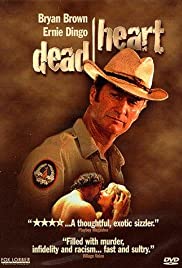
DEAD HEART
Australia, 1996, 104 minutes, Colour.
Bryan Brown, Ernie Dingo, Angie Milliken, Gnarnayarrahe Waitairie, Aaron Pedersen, John Jarratt, Anne Tenney, Lewis Fitz Gerald, David Gulpilio.
Directed by Nick Parsons.
A film about the Australian centre and about aboriginal issues that has received critical acclaim. It seems quite ambiguous in its treatment of aborigines and in where it stood. It is based on a play by Nicholas Parsons, who also directed the film.
Producer is Bryan Brown who appears in the role of the policeman, a rugged but weary man, a drinker who thinks he knows how to deal with everyone, basically a respectful man but one who is simplistic in his understanding of aborigines and their culture. Ernie Dingo is a pastor, caught between traditions and his Christianity and working for the bureaucracy. A number of aboriginal actors have strong roles, including Aaron Pederson. The whites include Angie Milliken, Lewis Fitz Gerald, John Jaratt and Anne Tenney and a cameo by David Guliplil. Perhaps this is the only way to dramatise the clashes between cultures, by highlighting the tensions and the mysterious.
Melodrama and issues in the Centre.
1. A story from the Centre? The 1930s setting? The relevance to later history
2. An aboriginal story, the aboriginal cast and the strength of their presence? Treatment of aborigines in the Centre in the early part of the 20th century?
3. The visuals of the desert, the outback, the towns, the aboriginal presence, the fewer white people, sacred sites? The musical score? Prison?
4. The structure of the film, Poppy and his memories, the flashbacks, the development of the drama?
5. The town, the tensions, the school teacher and his wife, the aboriginal pastor and his duties, the sexual relationship, Tony and the teacher’s wife, going to the sacred sites, the sexual encounter? His death?
6. Bryan Brown, a typical role, the police, as an officer, taciturn, upholding the law? Going into action?
7. Ernie Dingo as the pastor, his religious role, carrying it out, the influence of aboriginal traditions? Law, traditions, conflict?
8. Tony, his place in the town, his relationship with the schoolteacher’s wife, her boredom, the role of her husband, the sexual encounter? The nature of the sacred site? Tony being killed? The nature of his death? The investigation?
9. The resolution of the mystery? Justice, law? Payback? Lore?
10. The significance of the comment, not a black fella, not a white fella, just a fella?
11. The influence of films like this on Australian consciousness?
Baby Done
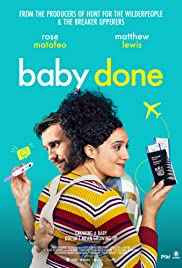
BABY DONE
New Zealand, 2020, 90 minutes, Colour.
Rose Matafeo, Matthew Lewis, Emily Barclay, Madeleine Sami, Rachel House, Ryan O' Kane.
Directed by Curtis Vowell.
At one stage, there is a listing of what women were expected to do in life: marry, have a house, baby – and, with that achieved, baby done.
This is a pregnancy film. There is plenty of comedy. And there are serious themes. In fact, quite a pleasing combination. (And, the executive producer is Taika Waititi with his celebrated sense of humour.)
The film depends on audience response to Zoe, the central character. She is played with quite some zest and sense of humour, with an appeal to pathos, by Rose Matafeo. Zoe is an arborist, working with her partner Tim in various parks and gardens. She has a particular skill in climbing trees – and jovial there is a worldwide competition for tree climbers in Canada and she is determined to go, winning a heat and qualifying.
But, Zoe is something of a hard case, Tim mentioning marriage at various times and Zoe having firm stances on no marriage. They go to a baby shower with all the mothers and fathers billing and cooing, Zoe rather put off. In the meantime, she has gone to have a pregnancy test – and she is pregnant. (This sequence introduces us to Madaleine Sami as, according to the credits, the Birthing Nurse – a down-to-earth woman of solid common sense who has no hesitation in giving straight and blunt answers and reappears, to the pleasure of the audience, in further sequences but, most especially, at the birth itself. And she is played by Madeleine Sami who co-wrote/directed and starred in that eccentric New Zealand comedy, The Breaker-Upperers?.)
Tim is a very nice man, played by Matthew Lewis (English actor who was in all the Harry Potter films). It is only when Zoe hesitates at a bungee jump and the technician twigs that she is pregnant, that Tim becomes aware of it and, of course, transforms into that protective, over-protective, perpetually caring about-to-be father. Which Zoe likes, but doesn’t like, especially when she insists on going to the competition in Canada.
Of course, there are quite some ups and downs. Tim likes going to the birthing classes and becomes very friendly with another mother. Zoe gradually lets her friends know and Tim and Zoe visit Zoe’s parents, white mother, Maori father who is a gynaecologist and surgeon. Zoe also makes a list of what she and Tim want to do before they have the baby – and Tim foolishly mentions a threesome with the Zoe’s best friend. When Zoe sets it up, it is an almost-immediate disaster. Zoe also encounters a man whose fetish is pregnant women. Zoe appreciates the attention but, ultimately, when he does a plaster cast of her body, it is too much.
No prize for guessing how the film ends but, of course, that is the delight, Tim so happy, Zoe loving her baby, the birthing nurse having laid down the law for both Zoe and Tim, Tim’s video of highlights of the pregnancy, and happy photos of mother and father and baby, celebrating life.
1. The title? Women’s achievements – and baby done?
2. A New Zealand film, the city settings, homes, parks and gardens, the countryside, the sea? The New Zealand sense of humour? The New Zealand accent?
3. Zoe’s story, Rose Matafeo and her screen presence, solid, jovial? Age? Partnership with Tim, comfortable with him? Her work as an arborist, with Tim, skill at climbing trees, the international competition in Canada, her determination, practising, the heat, accepted?
4. Tim and Zoe going to the baby celebration, the parents and their delight, the babies, Zoe getting a fright? Her not wanting to be there? Leaving? Molly present, best friend, her international trips and conclusions?
5. The bungee jump, her hesitation, the technician, blunt saying she was pregnant, Tim’s shock? Her pushing him over? The audience knowing she was pregnant, the visit to the clinic, the birthing nurse and her down to earth manner, orders? Zoe’s reaction?
6. Doing the test again for Tim? The visit to the nurse, the ultrasound, Zoe not wanting to know the gender, Tim wanting to know and its being written on the note? Tim becoming protective, overprotective? The going to the sessions? Tim liking the sessions, the encounter with Beth, giving her a lift, her flirting?
7. Zoe and the list of what they wanted to do, dancing, Tim and the ecstasy tablets in safe circumstances, the threesome with Molly? Zoe setting it up, the fiasco of the threesome? Molly discovering Zoe it was pregnant – Zoe trying to tell her, Molly splashing in the fountains, relieved to hear that she wasn’t pregnant?
8. Zoe irritated with Tim, the decision to go to Canada, climbing the tree, stranded, Tim’s friend trying to rescue, the having to call in the ladder?
9. Zoe, the connection with Brian, his fetish about pregnant women, his response to her, awkwardness, friendship, his doing the plaster cast of her body, her running away?
10. Her visit to her parents, bun in the oven, her mother, her father and his marrying background, surgeon?
11. Zoe, the passport, going on the plane, the collapse, in hospital? The birthing nurse and her laying down the law, Zoe getting off the bed, the phone call to Tim, his being with his friend and the fireworks, hurrying, the bath, the blood, the nurse and her comments? The birth, Tim and the photo, the confetti, his being ousted? The aftermath, Tim and the video of the pregnancy, the photos of the three? A celebration of life?
Lucky Grandma
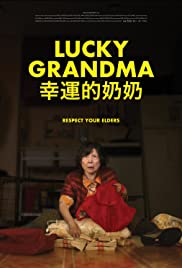
LUCKY GRANDMA
US, 2019, 87 minutes, Colour.
Tsai Chin, Hsiao- Yuan Ha, Michael Tow, Woody Fu, Mason Ya allm..
Directed by Sasie Sealy.
How lucky is lucky? And, who is Grandma?
This is a Chinese story, a story in the Chinese community in New York City, quite a vivid portrayal of the neighbourhood, the families, speaking Mandarin and Cantonese (but many of the next-generation becoming more Americanised), the range of customs, food, and the domination of local protection gangs. Quite a context.
Grandma is 80. However, this review needs to offer some praise for the actress who plays Grandma, Tsai Chin, from a classic Chinese acting family, training in London, entering her film career with the voice of Tokyo Rose in The Bridge on the River Kwai, making several Fu Manchu thrillers with Christopher Lee, twice a Bond Girl, and a career of over 60 years in film and television in England and the United States including The Joy Luck Club! And, her age at the time of portraying Grandma, a vigorous 85.
During the opening credits, Grandma goes to a fortuneteller with her various signs, cards, symbols – and the judgement that October 28 will be a very lucky day for journalling. Of course, it is and it isn’t. Her family want to move out of her apartment and live with them but she wants independence and withdraws all her money from the bank and goes on a bus expedition to a casino. She presumes on her luck and bets on the number eight, the lucky number, and plays all the games, winning until….
Tsai Chin plays Grandma as a tough cookie (perhaps an understated description for this cantankerous, determined old lady or, rather, old girl). And much is made of her characteristics symbol – the perennial cigarette, defiantly lit, inhaled, dangling from her lips. She makes quite an impression – and you might not like to encounter her in a dark alley on a dark night!
Actually, on the bus home, her luck changes but you will need to see the movie to find out how this could be.
Gangsters threaten Grandma and she goes to one of the local gangs to bargain for a bodyguard for a week, $5000 but cut rate to $2000 for the tall big softy she gets, Big Pong, Hsiao Yuan Ha, affable but often enough earning his fee! The local thugs are rather leering and presumptuous about dominating Grandma. Which means that there are some tough sequences, some funny sequences, some slapstick.
One presumes that there is an eager Chinese audience all around the world who will enjoy encountering Grandma – even though they might avoid her in real life! And, for wider audiences who might enjoy something different, they might be in luck in going to see Grandma.
1. Title? The focus on Grandma, the nature of her luck, Chinese luck and traditions? In the American context?
2. New York City, the Chinese neighbourhood, homes, streets, shops, fortunetellers? Gangster headquarters? The musical score?
3. Grandma going to the fortuneteller, the opening credits, the Chinese signs, the cards, symbols, meanings? The number eight? October 28 – and luck for Grandma?
4. The shrine, memories of her husband, his not leaving her anything?
5. October 28, Grandma going to the casino, Grandma at 80, tough, forever smoking, the cigarette dangling, the bus ride, withdrawing her money from the bank, all of it, the bets at the casino, her continued winning, the variety of games, her eventual loss, her reaction?
6. On the way home, the man beside her, leaning on her, his death, her decision, his bag, the money? The consequences with the gangs in New York?
7. Grandma, the money, going shopping, the chandelier? The thugs at her home? Threats, taunts? Her denials?
8. Grandma going to the gang, the discussion, the bargaining for the bodyguard, getting Big Pong? His accompanying her? His character, large, somewhat passive, nodding off, eating, Beacon? Friendly?
9. Grandma in the streets with her bodyguard, getting ahead, the threats, Big Pond returning, his vanquishing the thugs?
10. Grandma and her family, her son, his wife, the grandchildren, the visits, very American? Their wanting Grandma to go and live with them? Her wanting to stay, paying for her apartment?
11. The various encounters with the thugs? Grandma going to Sister Fong, the discussions? The ownership of the money? The band on the bundles of notes?
12. The attack on the house, Big Pong, the thug killed, the other escaping out the window, then bundling up the thug and putting him in the rubbish?
13. Grandma and her grandson, David, his girlfriend, their doing the dance for online view? The old man complaining? Big Pong, Threatening? The group abducting David demanding the money?
14. Grandma, the money for Sister Fong, the bag, putting it with torn up paper? Emptying it? The attack, the shootout, deaths, Grandma being wounded, getting home, bandaging up her wound? The grandchildren wanting to see the wound?
15. Moving, going to live with her son?
16. An adventure of an 80-year-old, a woman in danger but tough, luck, running out of luck, the future?
Double Confession
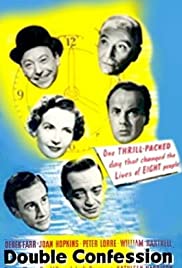
DOUBLE CONFESSION
UK, 1950, 80 minutes, Black and white.
Derek Farr, Joan Hopkins, Peter Lorre, William Hartnell, Naunton Wayne, Ronald Howard, Kathleen Harrison, Leslie Dwyer,, Edward Rigby, George Woodbridge, Mona Washbourne, Vida Hope, Esma Cannon.
Directed by Ken Annakin.
This is a murder mystery with a twist. It is a British feature from the beginning of the 1950s, very British in its characters, seaside setting on a holiday day, rather restrained investigation. The film is directed by Ken Anakin who had a very long career, starting with this kind of film in Britain, moving to Disney features during the 1950s, some rather more spectacular action adventures in the US in the 1960s, Those Magnificent Men…
Derek Farr was a sympathetic leading man of the period. Joan Hopkins, a rather gentle screen presence, made only a few films and retired to marry Dir Henry Cass. But, it is quite a surprise to find Peter Lorre in this kind of British film, quite an eccentric character. The film boasts quite a number of British character actors in supporting roles, led by William Hucknall as the building of the piece and literally Leslie Howard son, Ron Howard, as a newspaper editor.
The action takes place over one day, a dead man in the sea, a dead woman in a house, the links with the various characters, the police investigation – and some local colour with visitors to the seaside who have nothing to do with the plot!
1. The title? Expectations? Crime, murder mystery?
2. A day at the seaside, summer, holiday, the beachfront, the crowds, the people on the beach, the fair and the attractions, the hotel, apartments and offices, dining? The cliff, the sea, the house by the sea? The musical score?
3. Jim Headley, on the mail train, walking to the house, the night, the cliff, encountering the friendly fisherman? His seeing Jim Durham leaving the house, hiding? The next morning, the death of the man falling over the cliff into the sea? The woman in the house?
4. The police, the investigation, on the site, the recovery of the body from the sea, the dead woman in the house and her being taken out, finding half of the suicide letter? The interviews, the various meetings? The large Inspector following Jim all day?
5. Jim, away from England, his returning, the back story, Lorna typing for Durham, the marriage, Jim’s absence from England, Durham owning the house by the water, the wife living there under an assumed name? Her relationship with Durham?
6. Jim, going to the newspaper office, the discussion with the editor, asking for a job, getting information? Arousing suspicions? And the editor going to see Durham to get further information?
7. The passengers on the bus, coming for a day at the sea, Leonard and his yacht, coat and tie, trousers rolled up, in the water, Kate and her enjoying the day? The later meeting up at the funfair and enjoying the rides? Nothing to do with the plot!
8. And, on and off the bus, losing her purse, looking sad? Tripping on Jim lying on the beach? Sitting down, the rapport between them, and talking? The promise for lunch? Her leaving the hotel? The later encounters, looking over the sea, talking, going for a swim, the threat from the speedboat? Her telling Jim her story, single mother, jilted, the adoption of her daughter, the relatives going to Australia, not wanting to lose her daughter? Going to the fair, the shot from the shooting gallery? A revealing that she knew that Jim had killed his wife? Her continued support?
9. Durham, self-made man, saving the life of Painter, Painter hanging around, drinking and giving up drink, feeling a debt to Durham? In the apartment? The conversations? His wanting to kill Jim, drinking, going on the speedboat, the official police complaint, going to the bar, at the fair, taking the gun and shooting? His return to the apartment?
10. Durham, the relationship with Jim’s wife? His success over the years, owning the funfair, the hotel, the notices with his name writ large? His personality, managing the hotel, the staff?
11. Jim going to see him, the discussions about his wife, Jim phoning him anonymously, letting him know that he had seen him at the house and leaving?
12. Everybody gathering in the room, the police, the interrogations? Painter claiming he kill the wife – but not knowing that she had taken pills and killed herself? Jim giving the police the other half of the suicide letter? Jim and his wanting revenge against Durham, to implicate him? The revelation about the dead man in the sea, the knot on his tie?
13. Painter, the upset, on the roof, Durham holding onto his tie, Painter falling to his death?
14. The evidence of the time not, the Durham had seen Jim’s wife dead, had left, encountered the man on the cliff, trying to save him? The tie not?
15. The Jim had seen his wife dead, revenge that Durham had driven her to her death?
16. And the audience satisfied with the nice happy ending for Jim and an and the child?
Somewhere
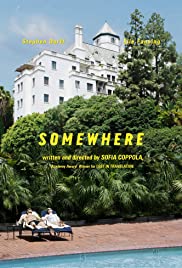
SOMEWHERE
US, 2010, 97 minutes, Colour.
Stephen Dorff, Elle Fanning, Chris Pontius, Michelle Monaghan.
Directed by Sofia Coppola.
Somewhere could have been called Anywhere or even Nowhere. The writer-director is best known for her Oscar-winning screenplay for Lost in Translation. This screenplay is just about someone who is lost.
There is an emotional problem with Somewhere, in identifying with the central character, your average film star, Jack (played with a blend of conviction in his performance and the lack of conviction required of his character by Stephen Dorff who has himself been around for a long time in the movies). Jack is not the kind of celebrity you would be eager to meet. He does the expected PR things, but there is a hollowness underneath this tinselly behaviour. We would not be satisfied if we were to spend time in his company. He is too shallow and too self-centred.
Sofia Coppola has set herself a very difficult task: how to make an interesting film centred on an uninteresting character. She has not always succeeded but, if we are willing, we can make allowances for that because she is showing the US movie industry and its hoo-ha and its potential for destroying those who are lost in it. As the daughter of Francis Ford Coppola, and appearing in some of his films, she has a fair amount of background to draw on. And what she brings up for her film is not exactly flattering.
But, what she does do is introduce a character to be interested in, Jack's eleven year old daughter. She is played effectively and interestingly by Elle Fanning. She is a young girl of imagination, has quite some poise (but she does not come across as a mini-adult as her sister, Dakota, did in so many films at that age and even younger) and really loves and is devoted to her father, no matter what. There are many scenes between father and daughter, even meals and cooking while he is carrying on with some woman or other. His wife has walked out on him.
While Jack is caught up wherever Somewhere is, we do see a lot of what is expected of the star: appearances and smiles for fans, supplying copy for interviews, spending lots of time in make-up (and being still for the setting of a face mask), being whisked off to the media rounds in Italy, especially for appearing on idiotic Italian TV shows and required to perform inanely, and relying on minders. Then he has a lot of free time where he presumes he must go womanising. Be with friends, hangers-on, surrounded by people who ultimately couldn’t care less about him.
There is a lot that is admirable in the making of and the performances for Somewhere but, maybe it couldn't, it doesn't completely grab attention or feelings.
1. A film by Sofia Coppola? The Golden Lion in Venice?
2. The director, her family, her experience of Hollywood, sharing her experiences, observing other Hollywood families?
3. The title, the style, vague and wandering? The visual style, slow, unfussy? The variety of critical responses, for and against?
4. The portrait of Johnny Marco, Stephen Dorff and his screen presence and performance? The opening, driving his black Ferrari, his status in Hollywood, star, his career, celebrity, the experience of the divorce? Media attention? Living at the Chateau Marmont, his lifestyle, promoting his new film, the variety of appearances, interviews, award ceremonies?
5. His private life, his friendship with Sammy, sharing the experiences? The driving, his drinking, pills, the casual sex, the range of women, the pole dancers¦?
6. Cleo arriving, Elle Fanning and her screen presence, her age, living with her mother, preparing to go to summer camp?
7. Johnny, with Cleo, the beginnings of his change, her accompanying him on his activities, the trip to Milan, the experience of Italy, the celebrity, the TV show? Johnny beginning to reassess his life?
8. Cleo going to camp, Johnnie phoning his ex-wife, his admitting his faults, tears, her not responding to his confession?
9. The end, leaving the Chateau Marmont, driving away, stopping, walking from the car, his smile, to what?